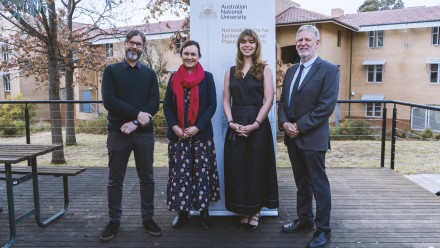About
The ANU National Centre for Aboriginal and Torres Strait Islander Wellbeing Research has earned national and international recognition for research excellence on Indigenous aspects of social and emotional wellbeing and racism, tobacco control, cancer and cardiovascular disease, as well as development of strength-based research methodologies, policies relating to data sovereignty, and culturally-relevant knowledge translation.
The Centre conducts excellent and transformative research on the most significant health and wellbeing issues that impact Aboriginal and Torres Strait Islander peoples’ lives, as identified through the proposed Indigenous governance structure and in alignment with the research priorities of Indigenous community partners, peak bodies such as NACCHO, and key funding bodies.
Members of the team are frequently called upon for policy and program advice by the Commonwealth, State and Territory Governments. The Centre has established partnerships with local and national Aboriginal and Torres Strait Islander community organisations and with philanthropic organisations such as the Ian Potter Foundation and Gandel Philanthropy.
Key Programs
Cervical Cancer Elimination – this body of work centres on achieving control and elimination of cervical cancer for Aboriginal and Torres Strait Islander peoples. Australia is on track to be one of the first countries to eliminate cervical cancer, however, Aboriginal and Torres Strait Islander peoples will be left behind unless we have in place an evidence-based, equitable and effective system of prevention through screening and vaccination.
Enhancing Chronic Disease Care – this program is focussed on enhancing chronic disease screening and management for Aboriginal and Torres Strait Islander peoples. It aims to better understand current primary health care services and follow-up - by identifying what works and what doesn’t, we can advocate to government to invest in successful models of care.
Kulay Kalingka –a first of its kind study in Australia, Kulay Kalingka will provide Aboriginal and Torres Strait Islander led and governed national-level data to understand Aboriginal and Torres Strait Islander people’s beliefs about cancer, and experiences with cancer care and treatment. Findings will guide national cancer control in research, policy and clinical care and improve outcomes for Aboriginal and Torres Strait Islander peoples.
Mayi Kuwayu – The National Study of Aboriginal and Torres Strait Islander Wellbeing; is the largest study of Indigenous well-being, with over 12,000 Aboriginal and Torres Strait Islander participants from across Australia. The mounting evidence from this impactful study is proving that connection to culture directly benefits wellbeing, evidence that informing policy change and local program design to result in better health and wellbeing outcomes for Aboriginal and Torres Strait Islander peoples.
Tobacco Free - works with Aboriginal and Torres Strait Islander peoples, communities and organisations to better understand, inform and evaluate smoke and nicotine free programs and policies, with the ultimate goal to support all Aboriginal and Torres Strait Islander communities to be tobacco free.
Objectives
The Centre’s primary mission is to further strengthen the health and wellbeing of Aboriginal and Torres Strait Islander communities. This is achieved through excellent research and knowledge translation to community, policy and practice.
The Centre is uniquely placed to make a significant contribution to improving Aboriginal and Torres Strait Islander health and wellbeing. The Centre’s objectives thus are to:
- Align the Centre’s research agenda with the priorities of peak Indigenous organisations, community bodies and research funding organisations.
- Conduct high quality health and wellbeing research of local, national and international significance.
- Conduct research translation to inform policy and practice in local, state/territory and national jurisdictions, resulting in tangible benefits to communities.
- Uphold Aboriginal and Torres Strait Islander leadership, governance and ways of doing business.
- Build a program of training and education relevant to Aboriginal and Torres Strait Islander health and wellbeing that is focused towards community capability, policy makers, undergraduate and postgraduate levels.
- Continue to be a leading area within the ANU for employment of Aboriginal and Torres Strait Islander professional and academic staff.
The Centre is purposefully designed to create critical mass in Aboriginal and Torres Strait Islander education and research.
Our work
-
the elimination of cervical cancer and other racialised cancer inequities with a strong focus on implementation.
-
discrimination and racism, and strengths-based methods for quantitative research.
-
cultural wellbeing and health.
-
cancer awareness and treatment
-
tobacco and nicotine use informing tobacco control programs and policies.
-
Implementation science in primary care to reduce the impact of cardiovascular and other chronic diseases
-
Community data capabilities
Our team
Thiitu Tharrmay
-
Serving as a source of expertise and advice on Aboriginal and Torres Strait Islander wellbeing;
-
Providing advice on the appropriate conduct of research including ensuring that the research, dissemination and policy agenda reflects Aboriginal and Torres Strait Islander community priorities and values;
-
Providing links to other relevant research, policy and practice initiatives;
-
Assisting with developing relevant research questions;
-
Providing context for and supporting appropriate interpretation of results;
-
Facilitating the dissemination and translation of research findings;
-
Contributing to publications (including being listed as an author); and,
-
Reviewing results before publication.







